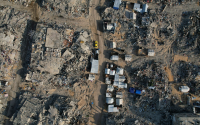April 8, 2003
In 1944, millions of Americans were engaged in desperate battles across the world. Nonetheless, a normal presidential election was held, and the opposition didn't pull its punches: Thomas Dewey, the Republican candidate, campaigned on the theme that Franklin Roosevelt was a "tired old man." As far as I've been able to ascertain, the Roosevelt administration didn't accuse Dewey of hurting morale by questioning the president's competence. After all, democracy — including the right to criticize — was what we were fighting for.
It's not a slur on the courage of our troops, or a belittling of the risks they face, to say that our current war is a mere skirmish by comparison. Yet self-styled patriots are trying to impose constraints on political speech never contemplated during World War II, accusing anyone who criticizes the president of undermining the war effort.
Last week John Kerry told an audience that "what we need now is not just a regime change in Saddam Hussein and Iraq, but we need a regime change in the United States." Republicans immediately sought to portray this remark as little short of treason. "Senator Kerry crossed a grave line when he dared to suggest the replacement of America's commander in chief at a time when America is at war," declared Marc Racicot, chairman of the Republican National Committee.
Notice that Mr. Racicot wasn't criticizing Mr. Kerry's choice of words. Instead, he denounced Mr. Kerry because he "dared to suggest the replacement of America's commander in chief" — knowing full well that Mr. Kerry was simply talking about the next election. Mr. Racicot, not Mr. Kerry, is the one who crossed a grave line; never in our nation's history has it been considered unpatriotic to oppose an incumbent's re-election.
Anyway, what defines patriotism? Talk is cheap; so is putting a flag in your lapel. Citizens prove their patriotism when they make sacrifices for the sake of their country. Mr. Kerry, a decorated veteran, has met that test. Most of his critics haven't.
I'm not just talking about military service — though it's striking how few of our biggest hawks have served. Nor am I talking only about financial sacrifice — though profiting from public office seems to be the norm, not the exception, among those who wrap themselves in the flag. (Mr. Racicot himself accepted the job as R.N.C. chairman only on the condition that he remain on the payroll of Bracewell and Patterson, a law firm that specializes in lobbying.)
The biggest test of a politician's patriotism is whether he is willing to sacrifice some of his political agenda for the sake of the nation. And that's a test our current leaders have failed with flying colors.
Consider the case of Tom DeLay, the House majority leader, who also piled on Mr. Kerry last week. As it happens, during the war in Kosovo Mr. DeLay was a defeatist, and blamed his own country for provoking Serbian atrocities; any Democrat who said similar things now would be accused of giving aid and comfort to the enemy.
Mr. DeLay's political agenda hasn't shifted a bit now that we're at war again. He's still pushing for huge, divisive tax cuts that go mainly to the rich: "Nothing is more important in the face of a war than cutting taxes," he says. And he's still eager to slash any and all domestic spending. In the midst of war he pushed through a budget that included sharp cuts in, yes, veterans' benefits.
You can see why Mr. Kerry blasted back, "I'm not going to be questioned in my patriotism by the likes of Tom DeLay."
Some timid souls will suggest that critics of the Bush administration hold off until the war is over. But that's not the American tradition — and anyway, when will this war be over? Baghdad will fall, but during the occupation that follows American soldiers will still be in harm's way. Also, a strong faction within the administration wants to go on to Syria, to Iran and beyond. And Al Qaeda is still out there.
For years to come, then, this country may be, in some sense, at war. And all that time, if Mr. Racicot and his party are allowed to set the ground rules, nobody will be allowed to criticize the president or call for his electoral defeat. You know what? If that happens, we will have lost the war, whatever happens on the battlefield.






